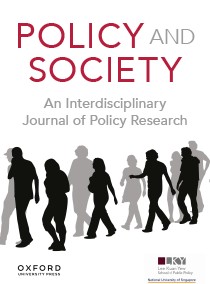多层次治理下的政策咨询体系质量:德国新冠肺炎经验
IF 6.1
1区 社会学
Q1 POLITICAL SCIENCE
引用次数: 0
摘要
决策者经常寻求科学专家的建议,以应对新的和复杂的政策挑战,但为解决这些问题而必须做出的决定往往需要各级政府以及国家和非国家行为体的合作。虽然现有文献承认政治背景影响科学政策咨询的过程,但缺乏对这种多层次结构如何影响科学政策咨询的具体期望或机制的表述。本文探讨了科学政策建议在多层次设置中面临的主要挑战,并详细说明了多层次结构如何支持和阻碍有效的问题解决。该研究强调,虽然纳入不同的治理层次可以用科学证据丰富政策辩论,但它也可能导致咨询结构碎片化,从而质疑科学证据的等级制度,阻碍科学政策的转移过程。我们用德国新冠疫情危机管理的经验证据来支持这一论点,德国在国内(联邦制)和国外(作为欧盟成员国)都是多层次治理结构的典范。这些发现强调了在跨越多个尺度的背景下,科学政策建议所面临的挑战。本文章由计算机程序翻译,如有差异,请以英文原文为准。
Policy advisory system quality under multilevel governance: the German COVID-19 experience
Policymakers frequently seek scientific expert advice to navigate new and complex policy challenges, but the decisions that must be taken to address these problems often require the cooperation of different levels of government as well as state and non-state actors. While existing literature has acknowledged that the political context influences the processes of scientific policy advice, it lacks the formulation of specific expectations or mechanisms on how such multilevel structures affect scientific policy advice. This article explores the key challenges that scientific policy advice faces in multilevel settings and specifies how multilevel structures can both support and hinder effective problem-solving. The study highlights that while the inclusion of diverse governance levels can enrich policy debates with scientific evidence, it can also lead to fragmented advisory structures that question the hierarchy of scientific evidence and hinder science-policy transfer processes. We underpin this argument with empirical evidence from COVID-19 crisis management in Germany, a country that is exemplary for multilevel governance structures both within its domestic context (federalism) and beyond (as a member of the European Union). The findings underscore the challenges for scientific policy advice in contexts that span across multiple scales.
求助全文
通过发布文献求助,成功后即可免费获取论文全文。
去求助
来源期刊

Policy and Society
Multiple-
CiteScore
18.00
自引率
6.50%
发文量
43
审稿时长
30 weeks
期刊介绍:
Policy and Society is a prominent international open-access journal publishing peer-reviewed research on critical issues in policy theory and practice across local, national, and international levels. The journal seeks to comprehend the origin, functioning, and implications of policies within broader political, social, and economic contexts. It publishes themed issues regularly and, starting in 2023, will also feature non-themed individual submissions.
 求助内容:
求助内容: 应助结果提醒方式:
应助结果提醒方式:


